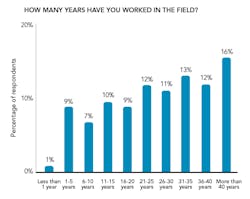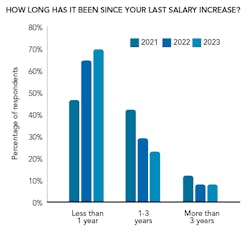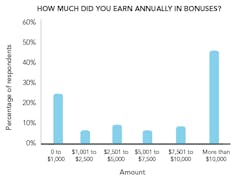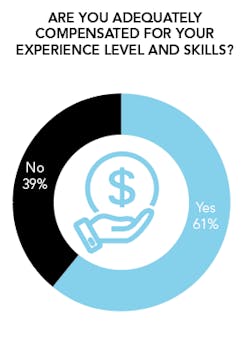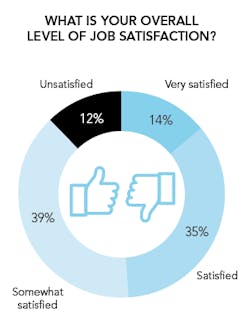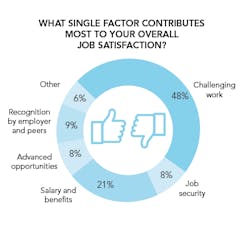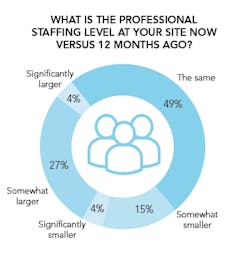CP editors picked this story as one the top articles for 2023. To view all of our Editors' Choice picks for the year, visit https://chemicalprocessing.com/33016377.
Chemical Processing first started conducting its Job Satisfaction and Salary Survey in 2005. In the nearly 20 years since, results have shown chemical industry positions can sometimes be a roller coaster ride, with ups and downs and twists and turns. COVID-19 in 2021 provided one such twist with some dips due to hiring freezes, but nothing as drastic a drop as the Great Recession. Fortunately, in 2022, we saw a rebound, with chemical engineering professionals having a banner year, and 2023 is no different. With that said, there are a lot of positives to report from this year’s results, and we’ll start with the financials.
First, the average salary and average raise both rose to their highest levels since we began conducting this survey. Chemical engineering professionals reported an average salary of more than $135,000 — up from $121,500 a year ago (Figure 1). This sits comfortably between other industry salary surveys, with the U.S. Bureau of Labor Statistics reporting a median salary in 2021 (no data yet for 2023) of $105,000 for chemical engineers. On the other side of that conservative number, the American Institute of Chemical Engineers (AIChE) recently revealed their members receive an average salary of $150,000.
One noticeable trend that sheds light on the higher salary report is the age and experience of our respondents: When added up, more than 40% of our workers say they have been in the industrial field for 31-plus years (Figure 2). In 2022, just 28% were well-seasoned professionals. In addition, of the 40%, 16% say they have been working for more than 40 years, double the 8% in that category last year.
(By the way, for some context, from year to year, we typically see no more than a 2%–3% variation in any particular response to our salary survey questions, so any increase above that certainly deserves mentioning.)
Both salary and raise increases could also be linked to 69% (63% in 2022) reporting a salary bump within the last year (Figure 3), with experienced experts likely receiving even higher salaries. In addition, our respondents, on average, received almost a 5% increase in their salaries, up from 4.16% in 2022.
More than 50% received a pay increase between 2.5% and 5%, similar to 2022, but those reporting salary adjustments between 5.1% and 7.5% jumped 5% from last year, and the 7.6%–10% range nearly doubled from the year prior to almost 10%. Those reporting smaller pay increases of less than 2.5% dropped nearly 12% from last year.
BENEFITS OF A BONUS
In addition to the generous salary increases, engineers also earned hefty bonuses. The average bonus was $8,415; in 2022, the average bonus was $7,480 and $6,015 in 2021. In fact, nearly half of respondents (46%) reported receiving bonuses of more than $10,000, up from just 37% last year (Figure 4). A sampling of write-in responses confirms the survey findings that bonuses are rising.
“I receive a good base pay with a potential bonus opportunity of 15% of base, with a multiplier applied. For the past several years, the multiplier has been greater than 1,” shared one respondent.
“The compensation grows via bonus and has grown year-over-year,” reported another survey participant.
“I am happy with the compensation and benefits I receive. I am on a bonus structure that is based on company performance, and I have a direct impact on how the business performs. It has certainly incentivized me to give my best because it will ultimately pay off for me if the company is successful at exceeding targets,” explained another.
In fact, respondents share that their bonus structure is tied to either the financial performance of business units (38%) or based on meeting/exceeding performance expectations (37%).
“I am satisfied with my compensation. My annual bonus (max 20% of salary) is tied to company performance (20–50%) and also to personal performance (20–50%),” noted one contributor.
“The bonus has a strengthening and motivation aspect as it is usually given at Christmas and so it enhances the team loyalty,” suggested one commenter. “The compensation is fair and comparative to industry.”
Most respondents (61%) agree that they receive fair compensation based on their experience level and skills (Figure 5). But this percentage has decreased from the 70% who reported feeling adequately compensated in last year’s survey. Some comments indicate this could be attributed to several factors, including rising health care costs and inflation.
“I believe I am compensated well, and my company’s benefits are great, but the increase in pay has not kept up with inflation, and benefits for those who work on site every day are not comparable to those who can work from home,” shared one respondent.
“I believe I am fairly compensated for the work that I perform, I believe [there is] room for improvement, but I am not dissatisfied with my current compensation. I am dissatisfied with the fact that inflation is outstripping my annual salary increase, but I do not blame that on my employer,” said one participant.
“I am well compensated for my peer group and field. Current inflation is outpacing increases inverse the last few years,” cautioned another.
WORKLOAD WOES?
Overall job satisfaction sits at 88% (Figure 6), which fell slightly from 2022’s 91%. Write-in responses indicate increasing workloads may have contributed to the slight decline.
“[I’m] compensated well, but for the workload, duties and responsibilities, it is not where it should be,” said one participant.
A recurring trend in previous surveys, heavy workloads continue to be a significant drawback, with 47% of respondents identifying it as one of their top three grievances about working in the field (Figure 7).
“Compensation would be adequate if I had reasonable work hours,” lamented one contributor.
“For the workload and job scope based on company need and the company’s organizational maturity, [my compensation and benefits] are below par,” shared another.
“If you want to get to the top, put in the hours and continuously learn, advised one contributor.”
“Consider non-manufacturing work to avoid long hours and being on call 24/7,” cautioned another.
Despite the long hours, the largest detractor remains the lack of recognition with 54% placing it in their top three dislikes.
“[The job is] challenging work without recognition. If you need external recognition, this isn’t the job for you,” advised one participant.
The work environment rounded out the list of top three occupational dislikes.
Still, 75% of participants also say the challenge and stimulation of their work ranks among the top three things they like best about their job (Figure 8). In fact, it’s the most significant contributing factor to overall job satisfaction or dissatisfaction, followed by salary and benefits (Figure 9). Echoing this sentiment, 60% listed the salary and benefits as one of their top three likes, and working with colleagues took the third spot.
We also asked participants what keeps them motivated in their career, and many said it’s their coworkers. Other motivating drivers? The list is extensive, ranging from family to learning new skills, mentoring young engineers and even retirement.
“I retire in less than three months, so I’m up to my ears in transition activities. I am motivated to pass on as much of my (admittedly old-fashioned) process and operations and cybersecurity knowledge, but the pace of change is rapid,” commented one survey participant.
HIRING NOW
Retirement is a goal for many survey participants, and with that, job opportunities could lie ahead for many others.
Martha Moore, chief economist and managing director of economics and statistics at the American Chemistry Council, recently noted in her 2023 Mid-Year Situation & Outlook webinar hosted by Chemical Processing that chemical industry employment has been on the rise after dropping for several years. Last year, employment hit its most recent peak: “550,000 people were employed by chemical manufacturers, earning on average well over $97,000 last year. These are well-paying jobs that help support local communities,” she shared.
Our survey participants echo this trend, with 27% reporting staffing levels are significantly higher than a year ago, a 3% rise from 2022 (Figure 10). In addition, nearly 50% report staffing levels have held steady over the last 12 months. In 2022, just 40% said staff levels stayed the same.
“We do expect to see some weakness in chemical industry employment,” cautioned Moore. “This year, we’re expecting payrolls to erode by about 3,000 as the industry shifts down a bit, but going forward, growth in chemical industry employment will resume in the latter part of the year.
In fact, 70% of our respondents say they aren’t worried about job security (Figure 11), an 8% jump from 2022 and an all-time low for our survey. In addition, 72% say they believe the chances they’ll be laid off or fired within the next two years is slim (43% said the chance is “very slight” while 29% said “none”) and less than a one-quarter say chances are “moderate.”
Furthermore, more than 50% said they intend to stay with their current employer for five years or less, and of that number, 11% say they’ll switch jobs (or perhaps retire) in less than a year, up from 7% in 2022.
Both job security and the potential move to a new employer could be attributed to the strong demand for chemical engineers and the shortage of skilled workers.
“We’re seeing some labor hoarding across the economy,” said Moore. “That’s one of the interesting features of this cycle. It’s so hard to find qualified people, and it takes a lot to lay people off at this point.”
In fact, many of our participants, when asked what keeps them up at night, mentioned finding and hiring quality engineers to replace retirees. “[It’s a] great time to get into engineering; our workforce is graying, with not enough young people willing to work the hours required. The exciting challenges are well worth the efforts, including promotions and better opportunities,” noted a contributor.


